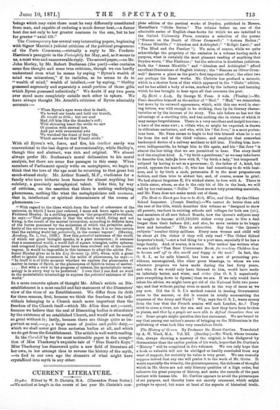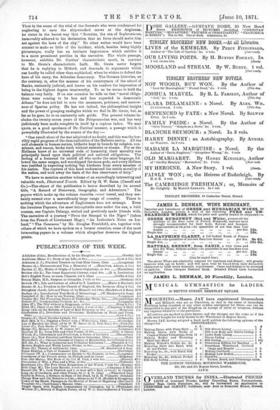tion, always showing a mastery of the original, is less
disfigured by
Germanisms than the earlier portion of his work, hopes that Dr. Cortina' " History " will be completed in five volumes. We can only hope that a book so valuable will not be abridged or hastily concluded from any want of support, for certainly its value is very great. We can scarcely suppose indeed that any one will prefer it to the work of Mr. Grote. It
wants especially the vivacity, the picturesqueness, the richness of thought which in Mr. Grote are not only literary qualities of a high order, but subserve the great purpose of history, and make the records of the past
instinct with human life. Dr. Cortina appears to avoid the picturesque of set purpose, and thereby loses not merely ornament, which might perhaps be spared, but some at least of the aspects of historical truth.
Thus in the scene of the trial of the Generals who were condemned for neglecting to save the shipwrecked crews at the Arginuss3, he states in the barest way that "Socrates, the son of Sophroniscus, immovably adhered to his declaration that no force should make him act against the laws of the city." No other writer would have been content to make so little of the incident, which, besides being highly picturesque, really has an intrinsic importance which entitles it to a more prominent position in the narrative. The whole passage, however, exhibits Dr. Curtius' characteristic merit, in contrast to Mr. Grote's characteristic fault. Mr. Grote never forgets that he is replying to Mitford, and descends to arguments which can hardly be called other than sophistical, when he wishes to defend the hero of his story, the Athenian democracy. The German historian, on the contrary, is, after the manner of his countrymen of the school of Ranke, eminently judicial, and leaves on his readers the impression of being in the highest degree trustworthy. To us he seems to hold the balance very fairly. If on one occasion he tells us that "moral obliga- tions were coming to be less and less regarded in democratic Athens," he does not fail to note the meanness, pettiness, and narrow- ness of Spartan policy. He has not indeed, the philosophical insight and the power of grasping analogies which we find in Mr. Grote, but, as far as he goes, he is an eminently safe guide. The present volume in- cludes the twenty-seven years of the Peloponnesian war, and has very judiciously been made complete in itself by a copious index. We may quote, as a good specimen of Dr. Cartius' manner, a passage which is powerfully illustrated by the events of the day:—
" One result alone of the war admitted of no doubt, and this was the hor- ribly rapid progress of the demoralization of the Hellenic nation. All the evil elements in human nature, hitherto kept in bounds by religion, con- science, and reason, broke forth without restraint or shame. For as the Hellenes knew of no universal code of humanity, their morality was principally based upon their political and national obligations. The feeling of a fraternal tie unit el all who spoke the same language, fol- lowed the same usages, and worshipped the same gotta, and every Hellene was justified in expecting nothing but kindness from every member of his nation. The rupture of this bond undermined the entire morality of the nation, and took away the basis of the due observance of duty."



































 Previous page
Previous page